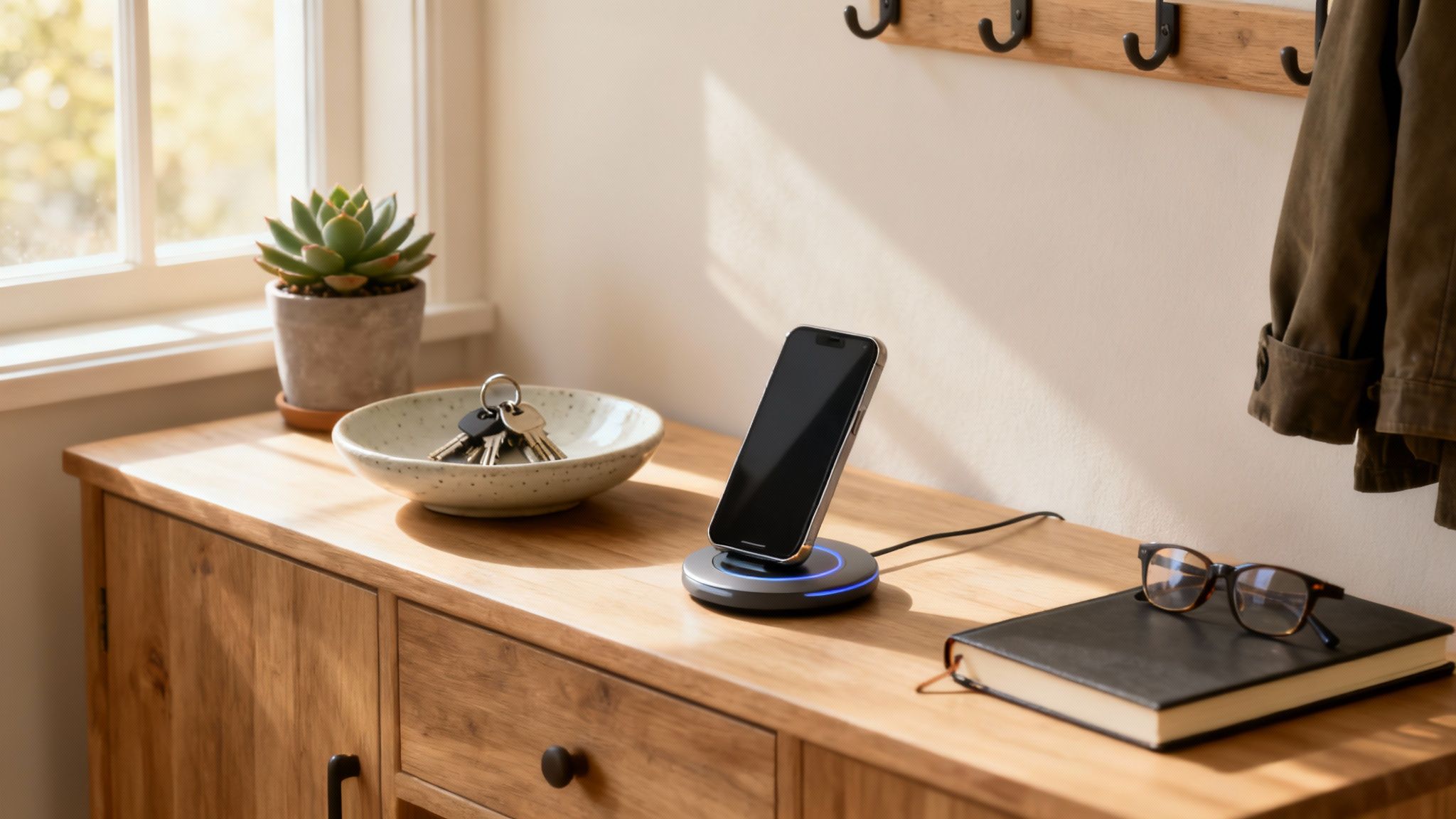If you have ADHD, you may sometimes feel like you’re the most intellectually engaged person in your social circle. Well, I have good news: You’re probably right. You’ve been exhibiting one of the most positive attributes of ADHD: curiosity.
Too long; didn’t read
- There’s a neurological reason why people with ADHD tend to be incredibly curious.
- Curiosity is not a character flaw; it’s an asset.
- Curious people tend to exhibit lower anxiety levels, higher satisfaction with life, and overall psychological well-being.
What does it mean to be curious?
Curiosity is the tendency “to recognize and seek out new information and experience,” including a strong desire to learn and develop knowledge.1 This desire is intrinsically motivated; you must genuinely want to learn something. If you’re seeking information because you have to, e.g., for a school research project, that is called external motivation and doesn’t qualify as curiosity.
What are the different types of curiosity?
Researchers categorize curiosity in different ways, 2,3,4 so there’s no definitive concept, but many describe at least three types of curiosity using a variety of names: diversive, epistemic, and social curiosity.
1. Diversive curiosity 5
Diversive curiosity is the sudden and short-lived desire to explore novelty. We express this type of curiosity from early childhood, but it stays with us into adulthood. This is about information-seeking at a broader level rather than diving deep. Diversive curiosity drives us to refresh our Instagram feed endlessly, click on interesting headlines, or hop from one Wikipedia entry to the next.6
2. Epistemic curiosity (aka cognitive curiosity) 7
Epistemic curiosity is the urge to eliminate information gaps and reach a thorough understanding of a specific topic. Think of research rabbit holes about your latest new hobby or when you just need to find the ultimate explanation for why it’s called ‘nautical dusk’ after looking up when the sun sets that day. (Just me who’d spend an hour on that quest? Yeah, that’s what my friends said, too...)
3. Social curiosity (aka empathic curiosity) 8
Social curiosity describes the drive to learn more about what other people think and feel. When you’re feeling comfortable and relaxed in a social setting, this state of curiosity is particularly pleasurable as it prompts high levels of dopamine release.
Are people with ADHD naturally curious?
People with ADHD are naturally inquisitive, and like many aspects of the ADHD personality profile, curiosity all comes down to dopamine.
Dopamine is a neurotransmitter that carries information between nerve cells. Brain regions housing the largest collection of dopamine receptors are often referred to as ‘pleasure centers’ because they make us feel good.
However, dopamine doesn’t just fire when we get our rewards; it’s also triggered when we’re curious — ready to explore and take advantage of new opportunities.
More dopamine is released when we encounter something that causes more curiosity in us, like something novel, risky, or challenging.
There’s an additional incentive for people with ADHD to be curious. Since ADHDers have dopamine in short supply, they tend to seek the “dopamine hit” triggered when curiosity is satisfied.
When an ADHDer comes across a topic they deem new and exciting, all other priorities fly out the window. Suddenly, they can focus — and probably on nothing else. They may retreat to a quiet area with their laptop and reemerge several hours later as a veritable human wiki. (Hyperfocus, table for one!)
🧠 If this sparked your curiosity in learning about the ADHD brain, head over to our dedicated article on the neurobiology of ADHD.
Curiosity is a good thing.
"I have no special talents. I am only passionately curious." - Albert Einstein
Curiosity improves learning.
Curiosity isn’t just related to brain chemistry; it changes brain chemistry — for the better! When curiosity is piqued, changes in the brain prepare you to learn about the subject at hand, as well as incidental information.9
Curious people are happier.
The benefits don’t end there. Highly curious people also tend to exhibit lower anxiety levels, higher satisfaction with life, and overall psychological well-being, which is associated with lower levels of depression.10,11 This correlation works in both directions: A decrease in curiosity is a common symptom of depression.3,12
Curiosity improves relationships.
Curious people are considered some of the most interesting and engaging and are more apt to reach out to a wider variety of people, including strangers.13
Curiosity also seems to protect people from unpleasant social experiences such as rejection, leading to stronger connections with others in the long run. Because curious people are also less aggressive and closed-minded,1 they make social interactions better for everyone, even those with social anxiety.
Curious people are more creative.
While the scientific evidence on ADHD promoting creativity is mixed and measuring creativity in research is a difficult undertaking, there are studies that confirm the connection between certain kinds of curiosity and creative performance and innovative problem-solving.5,14 Specifically in the realm of "divergent thinking, conceptual expansion and overcoming knowledge constraints", ADHDers may have a unique perspective that can be an advantage when it comes to questioning old conventions and coming up with completely new ideas.
Ready to unlock the power of your curiosity? Whether you're interested in ADHD’s neurobiology, helpful nutrition tips, or learning more about the benefits of ADHD, Inflow has you covered. Take our ADHD quiz to get started.
How to use ADHD curiosity to your benefit
The curiosity characteristic of those with ADHD is NOT something to be ashamed of. In fact, it’s a strength — both in professional and personal settings.
Apply your curiosity at your job.
Curiosity is an asset in a variety of industries.4 The most valuable lesson I learned in college was, “A journalist needs to learn everything about something and something about everything.”
Here are some careers that might be a good fit for curious minds:
- Freelance writer or journalist
- Counselor or therapist
- Director or editor
- Detective
- Creative fields, like photography and graphic design
- Event planner
- Forensic anthropologist
- Hiring manager
- Historian
- Culinary artist, baker, or chef
- Investigative reporter
- Market researcher
- Scientist or researcher
Share the gifts of curiosity.
An increasingly popular concept in the business world is skill-swapping: exchanging one’s services and expertise for someone else’s in a mutually beneficial agreement.
But such services don’t have to be profitable In the traditional sense. Putting curiosity to work for loved ones is a great way to convey gratitude for their acceptance and support amid all the quirks of your ADHD.
Here are a few curiosity gift ideas:
- Compiling sources for a term paper
- Conducting genealogical research
- Finding the answer to a question
- Searching for job opportunities
- Nailing bar trivia for your team
Final thoughts
Curiosity can have some negative ramifications. For example, you might ask so many questions after receiving instructions that your boss thinks you doubt their competence. Or maybe when you meet someone new, you put them off by trying to get to know them too intimately, too fast.
Then again, had Benjamin Franklin never thought, “I wonder what would happen if I flew my kite in this thunderstorm,” we’d probably still be working by candlelight.
Sources
1 Journal of Personality | Curiosity Protects Against Interpersonal Aggression: Cross-Sectional, Daily Process, and Behavioral Evidence (2012)
2 Curr Psychol | Curiosity: A conceptual re-analysis for improved measurement. (2023)
3 Neuron | The Psychology and Neuroscience of Curiosity (2015)
4 Human Resource Development Quarterly | Measures of curiosity: A literature review (2021)
5 Personality and Individual Differences | Outside the box: Epistemic curiosity as a predictor of creative problem solving and creative performance (2017)
6 Nature Human Behavior | Hunters, busybodies and the knowledge network building associated with deprivation curiosity (2021)
7 Journal of Individual Difference | Validity of the Interest-and Deprivation-Type Epistemic Curiosity Model in Germany (2013)
8 Personality and Individual Differences | The Five-Dimensional Curiosity Scale Revised (5DCR): Briefer subscales while separating overt and covert social curiosity (2020)
9 Neuron | States of Curiosity Modulate Hippocampus-Dependent Learning via the Dopaminergic Circuit (2019)
10 Applied Research Quality Life | Character Strengths – Stability, Change, and Relationships with Well-Being Changes (2020)
11 Polish Psychological Bulletin | Subjective well-being as a mediator for curiosity and depression (2014)
12 Journal of Personality | Within-person variability in curiosity during daily life and associations with well-being (2020)
13 Journal of personality | When curiosity breeds intimacy: taking advantage of intimacy opportunities and transforming boring conversations (2011)
14 Journal of Creative Behavior | A Meta-Analysis of the Relationship between Curiosity and Creativity (2019)







